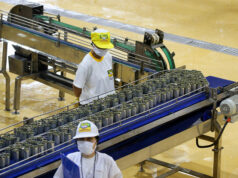BSP: Current policy can accommodate ECQ extension
THE central bank’s current policy stance can accommodate the impact of a possible extension or expansion of the enhanced community quarantine (ECQ), Bangko Sentral ng Pilipinas (BSP) Governor Benjamin E. Diokno said.
“The BSP’s recent moves are designed to be prospective, given our strong economic fundamentals,” Mr. Diokno said in a text message on Sunday. “We think the BSP is ahead of the curve.”
Presidential Spokesperson Harry L. Roque said in a radio interview on Saturday the ECQ could be extended or modified after April 30. A modified lockdown, according to him, will depend on geographical location, comorbidity or industries.
Earlier, Mr. Roque said a total lockdown could be enforced as the virus has yet to be contained and as cases continue to rise.
Resigned Socioeconomic Planning Secretary Ernesto M. Pernia earlier said extending the lockdown to May would be “difficult” and had suggested a gradual lifting that will allow the partial resumption of public transportation and mall operations.
The coronavirus disease 2019 (COVID-19) has already sickened 6,259 as of Sunday, according to the Department of Health. The death toll has reached 409, while recoveries have risen to 572.
Mr. Diokno said in an interview with ABS-CBN News Channel that its latest move to include lending to micro-, small- and medium-scale enterprises (MSMEs) as part of banks’ compliance with reserve requirements could be equivalent to a cut of more than two percentage points in the reserve ratio.
The move was announced along with the latest 50-basis-point (bp) off-cycle rate cut from the central bank last week, barely a month since it reduced policy rates by the same magnitude in March.
This brought the overnight reverse repurchase, lending and deposit rates to record lows of 2.75%, 3.25% and 2.25%, respectively.
The BSP has already slashed rates by a total of 125 bps for this year, following the 75 bps in cuts in 2019. This means the BSP has completely reversed the 175 bps in hikes done in 2018.
Meanwhile, the central bank also reduced the reserve requirement ratio (RRR) for big banks by 200 bps in early April to 12%. Although it kept RRR for smaller thrift and rural lenders at four percent and three percent, the BSP shaved 400 bps off the minimum liquidity ratio (MLR) of stand-alone thrift, rural and cooperative banks to 16% until end-2020 to provide a liquidity boost for smaller lenders.
LOCKDOWN EXTENSION TO HIT FIRMS
According to Rizal Commercial Banking Corp. Chief Economist Michael L. Ricafort, another ECQ extension will take a toll on businesses.
“For the hardest hit business sectors, every two weeks of lockdown extension is equivalent to about four percent of production or income lost on an annualized basis,” Mr. Ricafort said in a text message.
But this is not to say an extension should not be taken into consideration as this is meant to contain the outbreak that could have greater impact on the global economy if left unchecked, he said.
“This is also a dilemma faced by many countries around the world — in whether or not to extend lockdowns,” Mr. Ricafort said.
UnionBank of the Philippines, Inc. Chief Economist Ruben Carlo O. Asuncion is also of the view that a modified quarantine could be the “ideal” way to ensure economic recovery.
“A shift to some form of a modified community quarantine is most ideal to help jumpstart the economy, but a probable extension may prove essential as a form of premature uncoiling of current interventions may result in a resurgence of cases,” Mr. Asuncion said in a text message.
He cited data from the Organization for Economic Cooperation and Development which estimates that countries’ gross domestic product (GDP) could lose 2% for every month in lockdown.
“A total lockdown from March 15 to May 15 is equivalent to four percent GDP decline, much of the average GDP output of the Philippines in recent years. We are not even talking about unemployment here,” he said.
“A careful balance must be adopted to help restrain the virus and jumpstarting the economy.”
The Philippine economy grew 5.9% in 2019. Prior to the outbreak, the government targeted GDP growth of 6.5% to 7.5% this year.
As the pandemic continues, Finance Secretary Carlos G. Dominguez III has said the country may see flat or zero growth or as much as a one percent contraction in GDP. — Luz Wendy T. Noble



